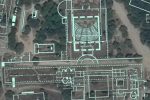Emerging Networks
Emerging Networks are a culture change mechanism intended to shift humanities research towards broadly collaborative, interdisciplinary engagements in contrast to the largely solitary efforts that tend to characterize traditional humanities research. Our goal is for nimble and opportunistic cross-disciplinary collaboration to become part of our ethos in realizing humanistic scholarly curiosity. Emerging Networks funding supports short term collaborative projects that must involve faculty, graduate students and undergraduates from multiple disciplines—across humanities departments and/or the social and natural sciences at Duke.
The Emerging Networks are meant to broaden the footprint of our traditional humanities departments, which abound in excellence in faculty research and doctoral studies. By providing small faculty/student groups access to modest funding, emerging ideas, projects, and networks may be launched, increasing the visibility of humanities efforts, giving faculty the incentives to be engaged in the creative and the experimental edges of their research, and generally fomenting humanities synergy across campus. These efforts will encourage innovative approaches to teaching and experimental collaborations organically arising within our humanities departments.
|
This project will develop "Civic Engagement Knowledge Maps" - a novel, university-wide resource conceptualized and designed by the Duke Center for Civic Engagement (DCCE) to identify, build, and strengthen links between civic engagement and Duke's...Read More about Knowledge Maps
|
|
For Staging Cultural Networks in the Language Classroom, the entire group of Italian Language Lecturers and Lecturing Fellows will redesign the third semester of Italian toward a student-centered pedagogy based on collaborative and experiential...Read More about Staging Cultural Networks
|
|
The co-conveners of this project, Sheila Dillon, Associate Professor of Art, Art History & Visual Studies, and Elizabeth Baltes, PhD candidate in Art History & Visual Studies, have begun with a series of questions relating to undergraduate...Read More about Wired!
|
|
Growing out of an ongoing international conversation about art markets, the conveners designed a team project to study the driving factors for the premium paid for the more significant works of art by period, geographical area, and clusters of...Read More about Duke Art, Law & Markets Initiative
|
|
This project investigates the cultural exchange between African American and German culture during the 20th century, from the Harlem Renaissance through the Civil Rights movement and beyond. Interdisciplinary as well as intercultural, the topic is...Read More about From Harlem to Hamburg
|
|
Most humanities faculty members unilaterally determine the themes, authors, books, blogs, and other materials to appear in an undergraduate level syllabus. Conversely, within most humanities classrooms, the same faculty members apply a more student-...Read More about Humanities on Demand
|
|
Empathy, or the ability to understand and participate deeply in another person’s experience, is considered a critical skill for physicians, both for clinical competence and for patient (and physician) satisfaction. Yet over the course of...Read More about Learning to Listen
|
|
The History Department has recently re-structured its major to provide undergraduate students with a framework for connecting their studies with their broader social, ethical, and professional objectives. The Department now seeks to link its...Read More about Networks of Knowledge
|
|
Associate Professor of English Rob Mitchell, who heads the Center for Interdisciplinary Studies in Science and Cultural Theory, and the Center Advisory Board, have received support from Humanities Writ Large to engage in significant outreach to...Read More about Neuroeconomics
|
|
The goal of the Performance and Integrated Media working group is to redefine our understanding of possible relationships between live performance and integrated media in the humanities in undergraduate education. The integration of advanced...Read More about Performance and Integrated Media
|
|
This project put together an international network of scholars and students based in German departments to provide the opportunity to build strength in linguistic fluency, cross-cultural literacy, and deep historical knowledge. Specifically, a...Read More about Rivalrous Masculinities
|
|
John Supko, Hunt Family Assistant Professor of Music, provided the impetus for the Sound Studies Project. He sees the two courses included, Audio Technology and Sound Studies Seminar, as a laboratory in which to test what they believe will be...Read More about Sound Studies
|
|
Culture and Conflict: Asia Writ Large is a departmentally based project in Asian & Middle Eastern Studies (AMES), where faculty are convinced that as the borders of the world open and the frequency and intensity of cross-cultural contact...Read More about Culture and Conflict: Asia Writ Large
|
|
Professor Carla Antonaccio and PhD candidate Timothy Shea are collaborating with Professor Donald Haggis and PhD candidates Cicek Beeby and Catharine Judson of the University of North Carolina-Chapel Hill to implement the first Duke-UNC...Read More about Duke-UNC Archaeology Network
|
|
Maurizio Forte, William and Sue Gross Professor of Classical Studies and Visual Studies, is a pioneer in the field of digital and virtual archaeology with research projects in Italy, China, Ethiopia, Mexico, Egypt, Peru, the United States, and...Read More about Envisioning Landscape Archaeology
|
|
This project investigates the cultural exchange between African American and German culture during the 20th century, from the Harlem Renaissance through the Civil Rights movement and beyond. Interdisciplinary as well as intercultural, the topic is...Read More about From Harlem to Hamburg
|
|
Muslim Publics: Religion and Revolution examines the aesthetics of political change in the Middle East through three distinct but interrelated projects on social media and social movements (Negar Mottahedeh), Islamic understandings of human rights...Read More about Muslim Publics
|
|
As Duke continues to enhance its offerings in the arts, faculty in African & African American Studies (AAAS) and the Dance Program are working to solidify and advance their humanities-based coursework and research by creating two new courses: "...Read More about Performing Culture
|
|
Human rights fires the imaginations of peoples around the world struggling for greater political, social and cultural space even as the phrase escapes a one-fits-all definition, with activists constantly reinterpreting and reimagining what...Read More about Rights Connect
|
|
Through three cooperating classes, culture-language-media workshops, a group documentary conducted by artists from the Latino community, and partnerships between Duke students and local high school and community college students, with final outcomes...Read More about Two-Way Bridges
|
|
Until recently “academic writing” was primarily understood as a discipline-specific, closed access, single-medium communication produced for a limited audience of academic specialists. In our digital age, however, the concept is being adapted to...Read More about Writing in a Digital Age
|
|
Although one would think that simple questions such as “What did Dante’s copies of Virgil and Aristotle look like?” and “What images of the Crucifixion had he seen?” have already been answered, they remain surprisingly unresolved. Indeed, how Dante...Read More about Dante's Library
|
|
Classical studies is in some ways one of the first structurally interdisciplinary fields in the modern academy. For years, its productive ties to fields such as literature, philosophy, political science, or law were an automatic result of...Read More about Democracy and Law
|
|
This project will connect Duke students who are heritage speakers with students in other colleges in the USA and in Mexico who have similar backgrounds (a heritage speaker speaks English and also speaks or at least understands a language other than...Read More about Framing Identities in Motion
|
|
Until the last decade or so, African-American and working-class white women cleaned the houses of the well-off in the American South. There has been a striking changeover in recent years. Thanks to the massive influx of Latin American migrants into...Read More about Housecleaner Project
|
|
In a pilot initiative that is part of a longer-term collaboration, Duke University and the SNCC Legacy Project plan to chronicle the historic struggles for voting rights that youth, converging with older community leaders, fought for and won.
In...Read More about One Person, One Vote
|
|
Most humanistic disciplines underwent a profound transformation during the challenges to the academy associated with second wave feminism, between the early 1960s and the early 1980s. The canon in many fields was overturned, pedagogy was rethought,...Read More about Project Vox
|
|
“Subnature” is a word coined by architectural historian David Gissen for aspects of nature that the architectural discipline has traditionally shunned, such as dankness, darkness, mud, weeds, smoke, puddles, dust, debris, crowds, and pigeons....Read More about Subnature and Culinary Culture
|
|
The 99 Percent: Poverty, Justice and Human Rights creates an intellectual framework for addressing the nexus between poverty and human rights and includes research as well as curricular and practice-based strategies for involving faculty, graduate...Read More about The 99 Percent
|
|
The term “genocide” is a mainstay of contemporary human rights discussion and policy. It is applied to a diverse swath of ethically charged human atrocities, from slavery to microbial disease. But, as Michael Ignatieff writes, “calling every abuse...Read More about The Language of Genocide
|
|
The US invasion of Iraq in 2003 launched a mass migration of Arabs out of their homes in order to escape violence. This has been exacerbated by foreign occupation, political instability and revolution, civil war, and Islamic extremism. Never before...Read More about Arab Refugee Oral History
|
|
The history of filmmaking in Africa is rooted in the tradition of ethnographic representation of the peoples and cultures of the continent by Europeans. When sound came to film in 1927 or so, the French recognized the power of cinema to work both...Read More about Cinéma Numérique Ambulant
|
|
Creation and Re-Creation: Great Works through a Prism (MUSIC 290S) will develop a class in which students study a dramatic work in its original form and then study reinterpretations of the work in other media. In the initial Spring 2016 offering of...Read More about Creation and Re-Creation
|
|
Of the 34 Level-1 Conflict Scenarios highlighted by a 2015 Council on Foreign Relations study, a staggering 32 are in Asia. Why do these conflicts persist despite seemingly endless and repeated interventions and negotiations? How do we educate...Read More about Culture and Conflict: Asia Writ Large II
|
|
Although one would think that simple questions such as “What did Dante’s copies of Virgil and Aristotle look like?” and “What images of the Crucifixion had he seen?” have already been answered, they remain surprisingly unresolved. Indeed, how Dante...Read More about Dante's Library
|
|
Until the last decade or so, African-American and working-class white women cleaned the houses of the well-off in the American South. There has been a striking changeover in recent years. Thanks to the massive influx of Latin American migrants into...Read More about Housecleaner Project
|
|
The United States has by far the highest incarceration rates in the world, with approximately 1 in every 108 American adults (2.3 million) currently in jail or prison. It is deeply divided by race: 1 in 15 African American men are currently...Read More about Mass Incarceration
|
|
In a pilot initiative that is part of a longer-term collaboration, Duke University and the SNCC Legacy Project plan to chronicle the historic struggles for voting rights that youth, converging with older community leaders, fought for and won.
In...Read More about One Person, One Vote
|
|
Most humanistic disciplines underwent a profound transformation during the challenges to the academy associated with second wave feminism, between the early 1960s and the early 1980s. The canon in many fields was overturned, pedagogy was rethought,...Read More about Project Vox
|
|
Environmental Humanities (EnHu) is a cross-disciplinary approach that brings skills, methods, and theories from several humanities disciplines to the analysis of problems and issues of high relevance for society in the context of new science and...Read More about Environmental Arts & Humanities Network
|



































